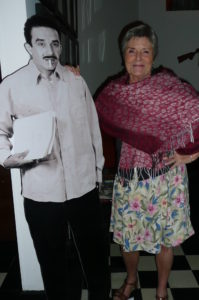I was beginning to feel I would never get control of the Spanish subjunctive. It is an evil thing, ubiquitous and complex; not even one Costa Rican friend I knew used it consistently, which added to my confusion. I decided I needed to visit my old Spanish teacher Enrique in Barranquilla, Colombia, so I wrote and asked if I could come for a week of intensive work. He was delighted and offered me his guest room and bath, classes every morning and a few excursions in the afternoons.
Barranquilla was home for a time to Gabriel García Márquez , so I felt I would be treading on hallowed ground. In fact, Enrique took me to an architectural wonder of a municipal museum with an exhibit of García memorabilia. In awe, I touched the battered leather suitcase he had used when he was an itinerant bookseller, receiving rum as payment more often than not. His typewriter was there, along with poster-sized photos of other great authors he had known, and there was a multi-media show featuring well-known quotations from his books. One evening, after several obligatory visits with Enrique’s family, we went to La Cueva, the former hangout of “Gabo” and other writers, journalists and artists. There was a life-sized cardboard cutout of him standing at the entrance to the dining room, and the coasters on the bar sported lively Gabo aphorisms. Enrique snapped my picture standing next to Gabo’s ghost.
But what entranced me more than anything was Enrique’s sending me, in advance of my visit, three short stories to “contrast and compare” on the theme of love, one of which was Gabo’s Nos vemos en agosto, an unpublished story transcribed from a live reading the author had given years ago in Madrid. Gabo had intended it as part of a longer work, which he never lived to finish, and so crudely typed transcriptions circulated among the literati, until finally the Spanish magazine La Vanguardia published it at the time of Gabo’s death.
I loved this story. The minute details all led inexorably to a wildly ambiguous ending that Enrique and I puzzled over for days, without ever coming to a conclusion. I read it again and again, always finding something new – always with just a touch of the magical – and I was dying to try my hand at a good literary translation. I wrote La Vanguardia to ask how they had gotten permission to publish it post-mortem and to point me in the same direction so I could request permission to publish a translation.
It isn’t difficult to fall in love with a writer as funny and precise about the human condition and incisive in his descriptions as García Márquez. And his story Nos vemos en agosto both captivated and challenged me. There were several ways one could translate the title, for example. We meet in August? We’ll meet in August? I’ll see you in August? We’ll see each other in August? Same Time Next Year? Does it suggest a future meeting? Or simply an event in the near past? Or something that happens every year? If only the author were alive to enlighten me! This is one person I would love to sit down with and converse at length about his work.
I’m afraid this story took up more of my class-time than the subjunctive, which I had been avid to conquer. Enrique had given me lessons and homework, and I studiously spent my afternoons going over the exercises, but Nos vemos en agosto simply wiped the subjunctive out of my head. (There is nothing subjunctive about the title . . . or is there?). The subjunctive is all about things that haven’t happened. “If I were only capable of understanding it,” is a good example in English. Could the story be a fantasy? The protagonist was certainly preparing herself for one. And could the lover have been a ghost (with his Musketeer mustache and white linen suit, smelling faintly of lavender water)? Ah, Gabo, I stood next to you, I drank at your bar, ate at one of your tables, read your story over and over, and still I don’t know!
© Sandra Shaw Homer, 2017


Enrique responds:
Muchas gracias por enviarme este artículo sobre tus experiencias y sentimientos sobre el subjuntivo en español. Bueno, en verdad, es mucho más que eso. Es una experiencia cultural, intelectual, afectiva y, ¿por qué no?, espiritual. Has reunido todos esos aspectos para presentarles a los lectores una narración que, escrita con gran habilidad y destreza, engancha al lector desde el principio. ¡Te felicito!